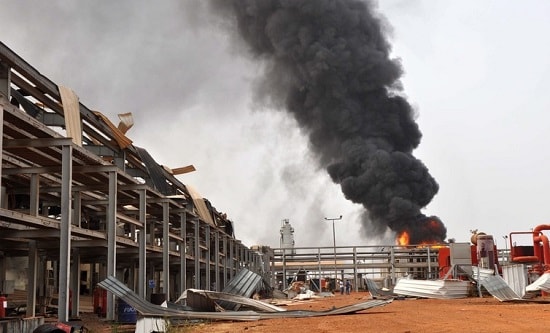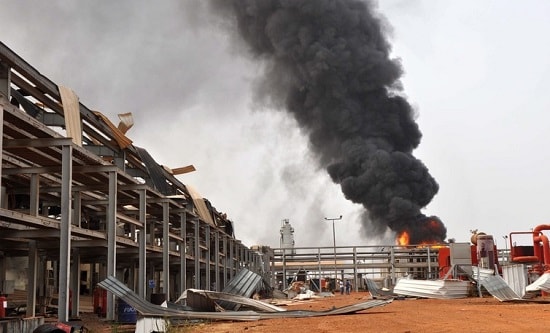
A fire at an oil factory in the area of Heglig in Sudan.
FRFI 181 October/ November 2004
The civil war in oil-rich Darfur, simmering since 1985, escalated into tragedy for millions of people from February 2003 onwards. The conflict is estimated to have killed between 55,000 and 100,000 people and driven up to 1.5 million people from their land. 110,000 people have sought refuge in neighbouring Chad. Whatever is behind the attacks on the people in Darfur, the imperialists, aided by a vapid media and complicit aid agencies, made their own plans long ago, and they did not include averting a humanitarian disaster, preventing genocide or ‘providing security for Darfur’s people’. Just as they did at the end of the 19th century in the rush for gold and diamonds, in a renewed competitive rush to plunder the oppressed nations of the world for their natural resources, especially oil, the imperialists are intent on neo-colonising and controlling Africa’s vast resources. Charles Chinweizu reports.
According to Human Rights Watch (HRW), the Sudanese military and government-backed militia (Janjaweed, of Arab descent) have been indiscriminately bombing civilians, destroying villages and conducting brutal raids against African ethnic groups, including routine rape of women and girls and abduction of children. The internal conflict is posed as ethnic strife when the real driving force for the violence which is victimising millions of poor people is the ownership and control of Sudan’s oil. Sudan does not manufacture helicopter gunships or fighter bombers – they have been supplied covertly by the US (or directly via clients Saudi Arabia, Yemen and Egypt), Russia and China. Fighting against the government in the south, including in Darfur, are the Islamist Justice and Equality Movement (JEM) and the ‘secular radicals’ of the Darfur Liberation Front (now renamed the Sudan Liberation Army/Movement (SLA/M). The rebels are well armed, mobile, have good intelligence and claim to have popular support. Behind these armed groups are the funds, arms and training provided by Israel, the US, Britain and France who act through neighbouring states.
Kleptomaniacs eye Africa
Africa is enormously rich in the raw materials that imperialism is dependent on, and the parasites are jostling into position for monopolisation, not just of the continent’s oil and natural gas supplies, but also of its metal and diamond reserves. Africa’s riches include manganese (for steel production), cobalt and chrome (also used in steel manufacture, particularly in aeronautics), vanadium, gold, tungsten, antimony, uranium (for nuclear technology), fluorspar, industrial diamonds and germanium (for semi-conductor electronics manufacture). Zambia and the Democratic Republic of Congo (DRC, formerly Zaire) possess 50% of the world’s cobalt reserves. 98% of world chrome reserves are in Zimbabwe and South Africa. 90% of world reserves of transition metals in the platinum group (palladium, platinum, rhodium, ruthenium, osmium and iridium, used extensively in the pharmaceutical/chemical industries) are in South Africa. Coltan (also known as columbite and a key component in electronic devices such as PlayStations, laptops and mobile phones) is a precious ore found almost exclusively in DRC.
Sudan is wealthy in mineral resources such as gold, uranium and chromium, and discovered vast untapped natural gas and oil reserves perhaps as large as Saudi Arabia’s in 1978. Sudan only began exporting oil in October 2000, mostly to China. Containment of China, especially its energy supplies, has long been a key policy ambition of the US. African oil reserves are estimated at 100 billion barrels or 10% of world reserves. Output has increased by 36% in 10 years compared with 16% for the rest of the world. Sub-Saharan Africa already produces more (4m barrels/day) than Venezuela, Iran and Mexico combined, and is the source of approximately 20% of US oil imports, expected to rise to 25% by 2015. Additionally, vast untapped reserves (estimated at 24 billion barrels) were discovered in the Gulf of Guinea archipelago in 1994-95. This is shared by São Tomé and Principe, Cameroon, Equatorial Guinea, Angola, DRC, Gabon, Congo Brazzaville and Nigeria – all oil producers.
Inter-imperialist rivalries
As the strongest imperialist nation, control of this strategically important region can help the US to stay ahead of its European rivals. With continuing resistance to US imperialism in the Middle East led by the Palestinians and Iraqis, the US needs Africa’s riches to ensure its economic survival. African oil is of ‘national strategic interest’ to the US as it ‘tends to be of high quality and low in sulphur, giving it a growing market share for refining centres on the east coast of the US’ (US Vice President, Dick Cheney, May 2002). It takes about two weeks to transport this oil from Africa to the US compared with six weeks for oil from the Gulf. The US aims to control key markets in energy and other strategic resources, to establish unimpeded transport of raw materials to the US by military force if necessary.
A key Pentagon strategy is to station thousands of rapid deployment and semi-permanent troops in and around the horn of Africa (Somalia, Sudan, Djibouti, Egypt, Ethiopia) and throughout West Africa. Two oil routes are at the centre of US plans: the Chad-Cameroon pipeline in the west, and Sudan’s Hegleig-Port Sudan (Red Sea) pipeline. Chad, a French neo-colony, also has oil, and there is talk of building a pipeline from Chad to Sudan. France has announced it will deploy 200 troops, previously ‘training Chadian forces in peacekeeping duties’ to ‘secure the Chadian side of the border’ with Sudan. In May 2003, a permanent US command base with 2,000 troops was established at Camp Lemonier, Djibouti, a desert country with no apparent resources or strategic importance except for its position near the Sudanese pipeline. It juts out into a small maritime zone through which 25% of all world oil production passes.
Equatorial Guinea is among Africa’s five biggest oil producers. In 2002 it was revealed that two-thirds of its oil concessions had been awarded to US companies with close ties to the Bush administration. Keen not to be left out, in March 2004 Britain and Spain funded a failed coup attempt, led by racist, apartheid-era thugs with links to the CIA, MI6, the Thatcher family and Texan oil operators (see page 4). Britain is now a net importer of natural gas and oil and sections of the British establishment freely admit that this is the real reason they have courted Libya and invaded Iraq.
Since the defeat of the US incursion into Somalia 1992-94, the US has put in place a number of training programmes for African army officers. These are co-ordinated by the US Army’s European command (US-Eucom). Techniques learned from US operations in Latin America and Vietnam and Laos are passed on to African armies. Recent visits to Africa by President Bush, Colin Powell and US-Eucom deputy commander General Wald are intended to further bind African states to US imperial power.
Racism and the Darfur crisis
On 30 July 2004, the UN Security Council adopted US-drafted resolution 1556, calling on Sudan to ‘end the fighting’ in Darfur, or face ‘economic and diplomatic measures’ in this ‘the world’s worst humanitarian crisis’. Sudan was given 30 days to ‘rein in’ and ‘disarm the Janjaweed Arab militia’ blamed for terrorising the people in an ‘orgy of murder, mutilation, burning and rape’ (The Independent, 8 August). The Sudanese government, despite numerous reports to the contrary, claimed the real casualty figure from Darfur’s civil war ‘doesn’t exceed 5,000’, but said it would comply.
The 30-day deadline was simply a prelude to the inevitable. On 9 September, US Secretary of State Colin Powell declared the situation in Darfur amounted to ‘genocide’. Foreign Office minister Chris Mullins agreed ‘it may well be genocide’ although it ‘hasn’t been demonstrated yet’. Indeed, Pieter Feith, an adviser to the EU’s foreign policy chief Javier Solana, had found ‘no evidence of genocide’ after a trip to western Sudan. Nonetheless, Britain and the US are pushing the UN Security Council for an international commission to investigate, and a second UN resolution calling for punitive measures including sanctions against Sudan’s ‘petroleum sector’. The EU has already imposed sanctions and is calling for a greater presence of ‘military observers’ from the African Union (AU).
While this global manoeuvring goes on, most victims of Darfur’s civil war will die of starvation, malnutrition and diseases such as cholera, malaria, hepatitis and diarrhoeal and respiratory diseases. None of the US’s ‘generous aid’ was intended to help the 2.2 million black Africans who died of AIDS or the three million who contracted HIV in 2003 alone. USAID administrator Andrew Natsios claimed there was no point providing anti-AIDS medication as ‘Africans don’t know what western time is’. Despite the fact that most of those in need of medicines live in Africa, only 1% of the world’s drug market is based in Africa. This racism, that denies essential medicines to black Africans, passes without mention, but the racism we are supposed to notice is the politically useful one of Arabs against blacks. Racism is in fact the culture of imperialism: ‘anti-terror’ raids, hijab bans, Islamophobia and racial discrimination at every level of society in the US and Britain.
What the people of Darfur need are not more imperialist troops or their proxies, but an end to the system that denies them medicines, funds both sides in wars, fosters divisions and racism, trains and arms terrorists and torturers, and supports slavery – all for profit. They need the destruction of imperialism.
Material for this article was drawn from various sources, including: Hanns W. Maull, Raw Materials, Energy and Western Security, 1984, Macmillan; Noam Chomsky, American Power and the New Mandarins, 1969, Pantheon Books (Random House); Jean-Christophe Servant, ‘The new Gulf oil states’, Le Monde Diplomatique, 8 January 2003; Jamie Wilson et al. The Guardian, 26 August and 10 September 2004; Declan Walsh, The Independent, 16 March 2004; Paul Lashmar, The Independent, 14 March 2004; Pierre Abramovici, ‘United States: the new scramble for Africa’ Le Monde Diplomatique, 8 July 2004.




